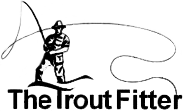
Report Date:
http://www.thetroutfitter.com/fshreport.html
Water Conditions: Good
Flows are 125 cfs as of 3/12
Flow rates dropped so maybe the late start to the winter is giving DWP hope that they can start cutting back on the flows a little bit.
There is Gorge access to the middle and upper power plants as well as the reservoir.
Fishing Conditions and Hatches: Good-Excellent
Well March didn't disappoint! The Grannom caddis have arrived and should be here for at least another 10-14 days. Another one of those hatches that can be very localized so if you haven't seen them by noon start searching. If you scroll through the pictures at the top of the report there's a short video of what the hatch looks like. Little hint, it's not just the swarm in the air it's also every speck on the water too. Best action is dry dropper, a lot of the "rises" are actually the follow through of their eating the pupae. Mid to late afternoon they will be eating egg laying caddis so alternate dead drift presentation with skittering and skating your dry flies and get ready!
February came through, now let's hope the March caddis hatch comes through as well! Both the hatches and the fishing have picked up, the only down side is that the BWO hatches are localized so if it's not happening by 11:30 start moving around. The hatch has been 11:00 to 2 or so with an emphasis on 1-2. The nymphing has been very consistent and dry fly action is picking up. The mayflies have gotten a little smaller #18-20. A not about the dry fly fishing. Because the hatches are so varied it's important to understand "rise form" and type of water the fish are rising in. Today by 12 there were aggressive rises in the main current seams while the slow foamy backwaters primarily had subtle "sippy" takes, so emerging BWO's around the main current and spent midges in the backwaters. The BWO emergence ended about 1:30 but the fish continued to feed in the slow backwaters until after 3. Just another example that along with hatches varying up and down the river but also in different water types within a small area. Another good sign is that there are just enough stonefly adults around that using #6-8 stonefly adult patterns instead of an indicator can be very effective.
The subsurface is a veritable smorgasbord. Several different species each of mayfly, caddis, black fly, midge and stonefly. Bigger flies have been working better than the smaller patterns # 10-16 Perdigons and stonefly patterns seem to be doing best. With all the bug life if we have anything close to a normal winter, fishing should be spectacular this spring.
A few things I've seen, the banks are very unstable and walking has gotten a lot better but be very careful around the high banks. Weed and brush overgrowth is spectacular.
DRIES: MIDGE-Stillborn Midge #20-22 | Griffith's Gnat #22-24 | CDC Transition midge #20-22 | No Mercy Midge #18-24 | Boroff F/Homie #20, 24 MAYFLY- Para CDC Baetis #16-22 | Para Adams #14-22 Hi-Vis Baetis #18-22 CADDIS- Millers C/Cad Olive and Tan#14-16 | RL Stimulator Yellow #14-16 | Elk Hair Caddis #14-16 STONEFLY- Chernobyl Ant #6-8
NYMPH: Pheasant Tail #14-22 | Hares Ear #16-22 |Perdigon #10-14 | Zebra Midge #18-22 |Weiss BP light or dark #18-20 | Bottom Roller Phsyco Rhyco #10-14 | Chamois caddis #16-20 | TB Millers +1 Lt #16-18 | Tungsten Sally #16-18 | Iron Sally #18 | HDA Fav. Variant #12-16 |
STREAMERS: Wooly Bugger Olive & Black #10-12 | Mini Sculpin Olive & Black #10-12